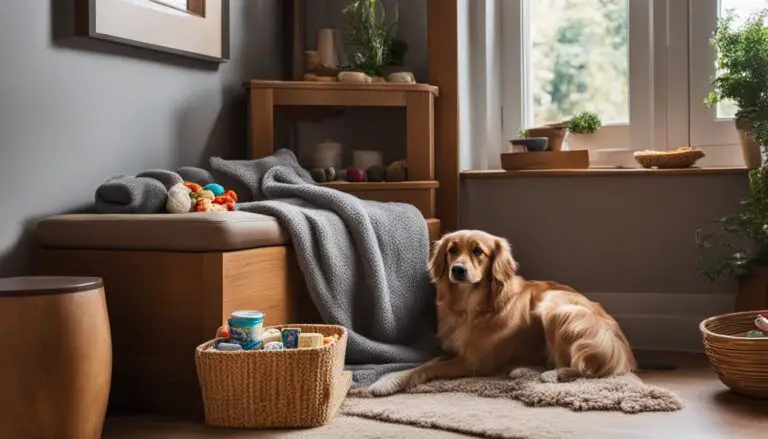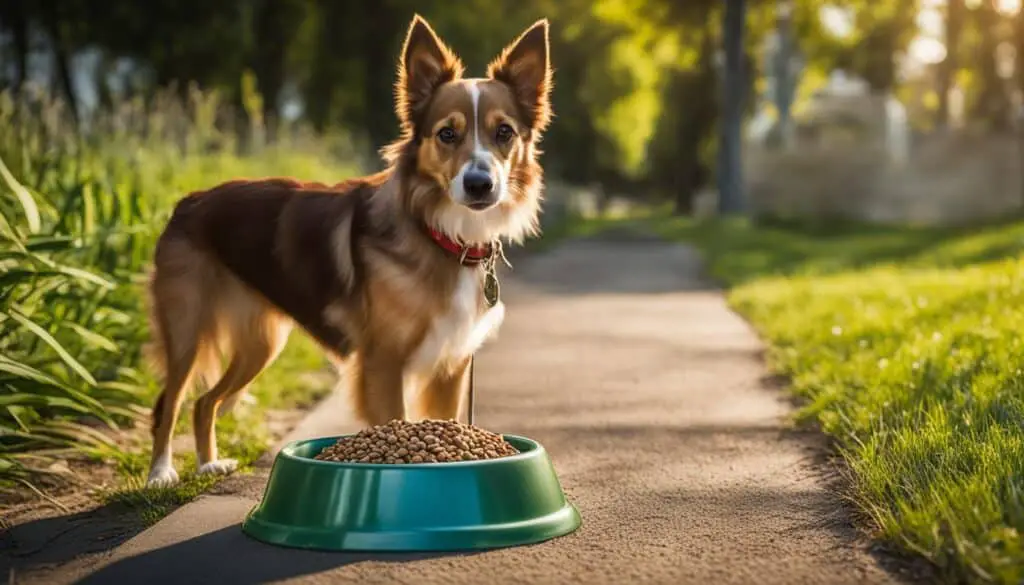As dogs age, they require special care to ensure their health and well-being in their golden years. Just like humans, senior dogs may experience changes in mobility, hearing, sight, and organ function. To provide the best care for your elderly small dog, it is important to make adjustments to their routine, diet, and environment. Here are some valuable tips for caring for elderly small dogs based on expert advice:
Key Takeaways:
- Elderly small dogs require specialized care to maintain their health and well-being.
- Adjust their diet to meet their changing nutritional needs.
- Schedule regular veterinary checkups to detect and address health issues early on.
- Pay special attention to dental care to prevent dental problems.
- Make necessary accommodations to ensure their comfort and safety.
Age-Appropriate Diet and Regular Exercise
Proper nutrition and exercise are key components of caring for elderly small dogs. As dogs age, their nutritional needs change, and it’s important to adjust their diet accordingly. Opt for high-quality, easily digestible senior dog food that is specifically formulated for their age group. These age-appropriate diets typically contain lower levels of fat and calories to prevent weight gain and promote healthy organ function.
Consulting with your veterinarian is crucial in determining the most suitable diet for your elderly small dog. They can provide personalized recommendations based on your dog’s health and any specific dietary requirements. By feeding your senior dog a proper and balanced diet, you can help them maintain a healthy weight, support their immune system, and reduce the risk of developing age-related health issues.
In addition to a suitable diet, regular exercise is essential for the well-being of elderly small dogs. While their activity levels may decrease with age, it’s still important to engage them in gentle exercise to keep their muscles toned and their joints mobile. Take your senior dog for daily walks, play low-impact games, or engage in other activities that are suitable for their physical abilities. Regular exercise not only helps maintain a healthy weight but also promotes mental stimulation and overall well-being.
Dietary Tips for Elderly Small Dogs
- Choose senior dog food that is labeled as “complete and balanced” to ensure all essential nutrients are included.
- Look for ingredients like lean protein, whole grains, fruits, and vegetables.
- Avoid foods that contain excessive amounts of fillers, artificial additives, or preservatives.
- Consider adding supplements like omega-3 fatty acids or joint support formulas if recommended by your veterinarian.
Exercise Recommendations for Senior Dogs
- Consult with your veterinarian before starting a new exercise routine, particularly if your dog has any existing health conditions.
- Focus on low-impact activities like gentle walks, swimming, or interactive play sessions.
- Allow for sufficient rest breaks during exercise to prevent overexertion or fatigue.
- Monitor your dog’s response to exercise and adjust the intensity or duration accordingly.
| Benefits of Age-Appropriate Diet and Regular Exercise for Senior Dogs |
|---|
| Aids in weight management and prevents obesity-related health issues |
| Supports healthy organ function and overall well-being |
| Helps maintain muscle tone and joint mobility |
| Provides mental stimulation and reduces the risk of cognitive decline |
Regular Vet Checkups and Special Accommodations
Regular veterinary checkups are crucial for the overall well-being of senior dogs. As dogs age, they become more susceptible to various health issues. By scheduling annual or biannual checkups, I can ensure that any potential health concerns are detected and addressed early on. During these checkups, my vet will perform a thorough examination, including blood work and screenings, to monitor my elderly small dog’s health.
Dental care is particularly important for elderly dogs. As they age, dental problems such as plaque buildup, gum disease, and tooth decay become more common. To maintain my dog’s oral health, I brush their teeth daily using a dog-friendly toothpaste and toothbrush. Additionally, I provide dental treats to help reduce plaque and tartar. Yearly professional dental cleanings are also recommended to keep my senior dog’s teeth and gums healthy.
In addition to regular vet checkups and dental care, special accommodations can greatly improve the quality of life for senior dogs. As their mobility may decrease, providing a comfortable and easily accessible environment is important. I ensure there are soft bedding and ramps or steps to help my dog reach elevated areas. Regular grooming is also essential to keep their coat clean and prevent matting, which can be uncomfortable for them.
By prioritizing regular vet checkups, dental care, and special accommodations, I can provide the best possible care for my elderly small dog. These measures help to maintain their overall health, prevent any potential issues, and ensure they age comfortably and gracefully.
FAQ
What changes should I make to my elderly small dog’s diet?
It is important to adjust their diet to meet their changing nutritional needs. Opt for high-quality, easily digestible senior dog food that is low in fat and calories. Consult with your veterinarian for specific dietary recommendations based on your dog’s health.
How often should I take my elderly small dog to the vet?
Regular veterinary checkups are essential for senior dogs. Schedule annual or biannual checkups and discuss any changes or concerns with your vet. This will help detect and address any health issues early on.
Is dental care important for elderly dogs?
Yes, dental care is particularly important as older dogs are prone to dental problems. Brush your dog’s teeth daily and consider using dental treats. Schedule yearly professional dental cleanings to maintain their oral health.
Are there any special accommodations I should make for my elderly small dog?
Yes, there are special accommodations you can make to ensure their comfort and safety. This may include providing them with a comfortable bed, easy access to food and water, and modifying their living environment to reduce the risk of falls or injuries.


